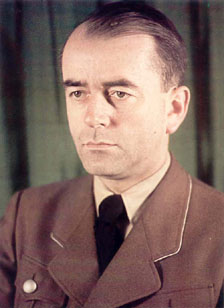
Known to history as 'The Nazi Who Said Sorry", Albert Speer is far from a simple man to understand. His overall level of involvement in the persecution of Jews throughout Europe and his overall knowledge of the Holocaust have been in dispute ever since the end of World War II. While he may be a complex man to comprehend, a closer look at him is still worth taking.
Berthold Konrad Hermann Albert Speer was Adolf Hitler's Chief architect for many years prior to his appointment as Minister of Armaments and War Production in the Third Reich. His career with the Nazi party began in 1931 and spanned a total of 14 years, right up to the eventual fall of the Nazis and the end of WWII. He designed numerous structures for the Nazis including the Zeppelinfeld Stadium and the Reich Chancellery, and had plans to redesign virtually all of Berlin.
In 1942, Speer was promoted to his post as the Minister of Armaments and War Production. This post saw him take command of Germany's war production, a position that involved maintaining adequate production levels even during periods of heavy allied bombardment. Speer managed to keep war production high and actually increased it throughout the final years of the war, despite the challenges that Germany faced in those waning days of WWII.
Speer realized that the end of the war was on the horizon, and began to plan out a way to keep himself safe and supplied following the war. However, he essentially worked towards leaving the dangerous areas of Berlin and left Hitler's side just a few days before the Fuhrer's suicide. He was captured and taken to various internment centers as the Allied forces decided how to proceed with his trial.
It was during the infamous Nuremberg trials that Speer earned his moniker as the "Nazi who said Sorry." He was indicted on four counts including crimes against humanity. During this time, Speer fully admitted his culpability in the atrocities of Nazi Germany and actually testified that he had concocted a plan to kill Hitler in early 1945, though he didn't follow through with it.
Unlike the majority of the Nuremberg Trial criminals, Speer was sentenced to imprisonment. Three judges ruled for the death penalty, but a compromise was eventually reached and the sentence of 20 years was levied against the man. In his later years, Speer wrote a book about his past and eventually died at the age of 76.
We are here to stop Holocaust Denial, Please help us fight by
donating to our cause. When you donate you will recieve our exclusive DVD "Hitler's Children". Thank you!